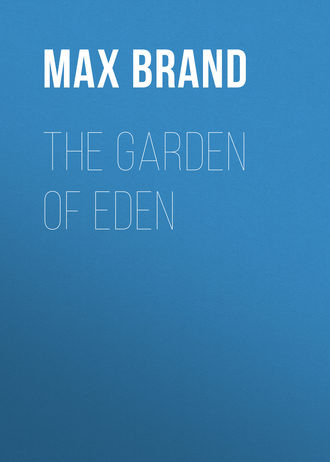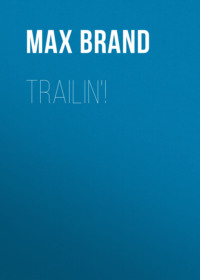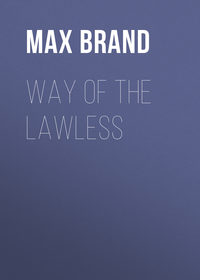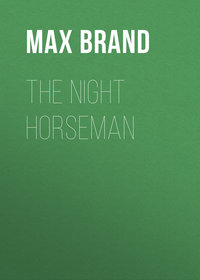 полная версия
полная версияThe Garden of Eden
"You think you're awake, but you're not. Tell you what a girl needs, a stage – just like an actor. Think they can put on a play with these mountains for a setting? Never in the world. Make the actors look too small. Make everything they say sound too thin.
"Same way with a girl. She needs a setting. A room, a rug, a picture, a comfortable chair, and a dress that goes with it. Shuts out the rest of the world and gives her a chance to make a man focus on her – see her behind the footlights. See?"
"Yes," she whispered.
"Do you know what I've been doing while I watched you just now?"
"Tell me."
He was fighting for a great purpose now, and a quality of earnest emotion crept into his voice. "Around your throat I've been running an edging of yellow old lace. Under your hand that was lying there I put a deep blue velvet; I had your shoulders as white as snow, with a flash to 'em like snow when you turned in the light; I had you proud as a queen, Ruth, with a blur of violets at your breast. I took out the tired look in your face. Instead, I put in happiness."
He stopped and drew a long breath.
"You're pretty now, but you could be – beautiful. Lord, what a flame of a beauty you could be, girl!"
Instead of flushing and smiling under the praise, he saw tears well into her eyes and her mouth grow tremulous. She winked the tears away.
"What are you trying to do, Ben? Make everything still harder for me? Don't you see I'm helpless – helpless?"
And instead of rising to a wail her voice sank away at the end in despair.
"Oh, you're trapped well enough," he said. "I'm going to bust the trap! I'm going to give you your setting. I'm going to make you what you ought to be – beautiful!"
She smiled as at any unreal fairy tale.
"How?"
"I can show you better than I can tell you! Come here!" He rose, and she was on her feet in a flash. He led the way to the door of the shack, and as the shadows fell inside, Shakra tossed up her head.
The girl's bewildered joy was as great as if the horse were a present to her.
"Oh, you beauty, you beauty," she cried.
"Watch yourself," he warned. "She's as wild as a mountain lion."
"But she knows a friend!"
Shakra sniffed the outstretched hand, and then with a shake of her head accepted the stranger and looked over Ruth's shoulder at Connor as though for an explanation. Connor himself was smiling and excited; he drew her back and forgot to release her hand, so that they stood like two happy children together. He spoke very softly and rapidly, as though he feared to embarrass the mare.
"Look at the head first – then the bone in the foreleg, then the length above her back – see how she stands! See how she stands! And those black hoofs, hard as iron, I tell you – put the four of 'em in my double hands, almost – ever see such a nick? But she's no six furlong flash! That chest, eh? Run your finger-tips down that shoulder!"
She turned with tears of pleasure in her eyes. "Ben Connor, you've been in the valley of the grays!"
"I have. And do you know what it means to us?"
"To us?"
"I said it. I mean it. You're going to share."
"I – "
"Look at that mare again!"
She obeyed.
"Say something, Ruth!"
"I can't say what I feel!"
"Then try to understand this: you're looking at the fastest horse that ever stepped into a race track. You understand? I'm not speaking in comparisons. I'm talking the cold dope! Here's a pony that could have given Salvator twenty pounds, run him sick in six furlongs, and walked away to the finish by herself. Here's a mare that could pick up a hundred and fifty pounds and beat the finest horse that ever faced a barrier with a fly-weight jockey in the saddle. You're looking at history, girl! Look again! You're looking at a cold million dollars. You're looking at the blood that's going to change the history of the turf. That's what Shakra means!"
She was trembling with his excitement.
"I see. It's the sure thing you were talking about. The horse that can't be beat – that makes the betting safe?"
But Connor grew gloomy at once.
"What do you mean by sure thing? If I could ever get her safely away from the post in a stake race, yes; sure as anything on earth. But suppose the train is wrecked? Suppose she puts a foot in a hole? Suppose at the post some rotten, cheap-selling plater kicks her and lays her up!"
He passed a trembling hand along the neck of Shakra.
"God, suppose!"
"But you only brought one; nothing else worth while in the valley?"
"Nothing else? I tell you, the place is full of 'em! And there's a stallion as much finer than Shakra as she's finer than that broken-down, low-headed, ewe-necked, straight-shouldered, roach-backed skate you have out yonder!"
"Mr. Connor, that's the best little pony in Lukin! But I know – compared with this – oh, to see her run, just once!"
She sighed, and as her glance fell Connor noted her pallor and her weariness. She looked up again, and the great eyes filled her face with loveliness. Color, too, came into her cheeks and into her parted lips.
"You beauty!" she murmured. "You perfect, perfect beauty!"
Shakra was nervous under the fluttering hands, but in spite of her uneasiness she seemed to enjoy the light-falling touches until the finger-tips trailed across her forehead; then she tossed her head high, and the girl stood beneath, laughing, delighted. Connor found himself smiling in sympathy. The two made a harmonious picture. As harmonious, say, as the strength of Glani and the strength of David Eden. His face grew tense with it when he drew the girl away.
"Would you like to have a horse like that – half a dozen like it?"
The first leap of hope was followed by a wan smile at this cruel mockery.
He went on with brutal tenseness, jabbing the points at her with his raised finger.
"And everything else you've ever wanted: beautiful clothes? Manhattan? A limousine as big as a house. A butler behind your chair and a maid in your dressing room? A picture in the papers every time you turn around? You want 'em?"
"Do I want heaven?"
"How much will you pay?"
He urged it on her, towering over her as he drew close.
"What's it worth? Is it worth a fight?"
"It's worth – everything."
"I'm talking shop. I'm talking business. Will you play partners with me?"
"To the very end."
"The big deaf-mute doesn't own the grays in that valley they call the Garden of Eden. They're owned by a white man. They call him David Eden. And David Eden has never been out in the world. It's part of his creed not to. It's part of his creed, however, to go out just once, find a woman for his wife, and bring her back with him. Is that clear?"
"I – "
"You're to go up there. That old gray gelding we saw in Lukin the day of the race. I'll finance you to the sky. Ride it to the gates of the Garden of Eden. Tell the guards that you've got to have another horse because the one you own is old. Insist on seeing David. Smile at 'em; win 'em over. Make them let you see David. And the minute you see him, he's ours! You understand? I don't mean marriage. One smile will knock him stiff. Then play him. Get him to follow you out of the valley. Tell him you have to go back home. He'll follow you. Once we have him outside you can keep him from going back and you can make him bring out his horses, too. Easy? It's a sure thing! We don't rob him, you see? We simply use his horses. I race them and play them. I split the winnings with you and David. Millions, I tell you; millions. Don't answer. Gimme a chance to talk!"
There was a rickety old box leaning against the wall; he made her sit on it, and dropping upon one knee, he poured out plan, reason, hopes, ambitions in fierce confusion. It ended logically enough. David was under what he considered a divine order to marry, and he would be clay in the hands of the first girl who met him. She would be a fool indeed if she were not able to lead him out of the valley.
"Think it over for one minute before you answer," concluded Connor, and then rose and folded his arms. He controlled his very breathing for fear of breaking in on the dream which he saw forming in her eyes.
Then she shook herself clear of the temptation.
"Ben, it's crooked! I'm to lie to him – live a lie until we have what we want!"
"God A'mighty, girl! Don't you see that we'd be doing the poor fathead a good turn by getting him out of his hermitage and letting him live in the world? A lie? Call it that if you want. Aren't there such things as white lies? If there are, this is one of 'em or I'm not Ben Connor."
His voice softened. "Why, Ruth, you know damned well that I wouldn't put the thing up to you if I didn't figure that in the end it would be the best thing in the world for you? I'm giving you your chance. To save Dave Eden from being a fossil. To earn your own freedom. To get everything you've longed for. Think!"
"I'm trying to think – but I only keep feeling, inside, 'It's wrong! It's wrong! It's wrong!' I'm not a moralizer, but – tell me about David Eden!"
Connor saw his opening.
"Think of a horse that's four years old and never had a bit in his teeth. That's David Eden. The minute you see him you'll want to tame him. But you'll have to go easy. Keep gloves on. He's as proud as a sulky kid. Kind of a chap you can't force a step, but you could coax him over a cliff. Why, he'd be thread for you to wind around your little finger if you worked him right. But it wouldn't be easy. If he had a single suspicion he'd smash everything in a minute, and he's strong enough to tear down a house. Put the temper of a panther in the size of a bear and you get a small idea of David Eden."
He was purposely making the task difficult and he saw that she was excited. His own work with Ruth Manning was as difficult as hers would be with David. The fickle color left her all at once and he found her looking wistfully at him.
She returned neither answer, argument, nor comment. In vain he detailed each step of her way into the Garden and how she could pass the gate. Sometimes he was not even sure that she heard him, as she listened to the silent voice which spoke against him. He had gathered all his energy for a last outburst, he was training his tongue for a convincing storm of eloquence, when Shakra, as though she wearied of all this human chatter, pushed in between them her beautiful head and went slowly toward Ruth with pricking ears, inquisitive, searching for those light, caressing touches.
The voice of Connor became an insidious whisper.
"Look at her, Ruth. Look at her. She's begging you to come. You can have her. She'll be a present to you. Quick! What's the answer!"
A strange answer! She threw her arms around the shoulder of the beautiful gray, buried her face in the mane, and burst into tears.
For a moment Connor watched her, dismayed, but presently, as one satisfied, he withdrew to the open air and mopped his forehead. It had been hard work, but it had paid. He looked over the distant blue waves of mountains with the eye of possession.
CHAPTER TWENTY
"The evil at heart, when they wish to take, seem to give," said Abraham, mouthing the words with his withered lips, and he came to one of his prophetic pauses.
The master of the Garden permitted it to the privileged old servant, who added now: "Benjamin is evil at heart."
"He did not ask for the horse," said David, who was plainly arguing against his own conviction.
"Yet he knew." The ancient face of Abraham puckered. "Po' white trash!" he muttered. Now and then one of these quaint phrases would break through his acquired diction, and they always bore home to David a sense of that great world beyond the mountains. Matthew had often described that world, but one of Abraham's odd expressions carried him in a breath into cities filled with men.
"His absence is cheaply bought at the price of one mare," continued the old servant soothingly.
"One mare of Rustir's blood! What is the sin for which the Lord would punish me with the loss of Shakra? And I miss her as I would miss a human face. But Benjamin will return with her. He did not ask for the horse."
"He knew you would offer."
"He will not return?"
"Never!"
"Then I shall go to find him."
"It is forbidden."
Abraham sat down, cross-legged, and watched with impish self-content while David strode back and forth in the patio. A far-off neighing brought him to a halt, and he raised his hand for silence. The neighing was repeated, more clearly, and David laughed for joy.
"A horse coming from the pasture to the paddock," said Abraham, shifting uneasily.
The day was old and the patio was filled with a clear, soft light, preceding evening.
"It is Shakra! Shakra, Abraham!"
Abraham rose.
"A yearling. It is too high for the voice of a grown mare."
"The distance makes it shrill. Abraham, Abraham, cannot I find her voice among ten all neighing at once?"
"Then beware of Benjamin, for he has returned to take not one but all."
But David smiled at the skinny hand which was raised in warning.
"Say no more," he said solemnly. "I am already to blame for hearkening to words against my brother Benjamin."
"You yourself had said that he tempted you."
Because David could find no ready retort he grew angry.
"Also, think of this. Your eyes and your ears are grown dull, Abraham, and perhaps your mind is misted also."
He had gone to the entrance into the patio and paused there to wait with a lifted head. Abraham followed and attempted to speak again, but the last cruel speech had crushed him. He went out on the terrace, and looking back saw that David had not a glance for him; so Abraham went feebly on.
"I have become as a false prophet," he murmured, "and I am no more regarded."
His life had long been in its evening, and now, at a step, the darkness of old age fell about him. From the margin of the lake he looked up and saw Connor ride to the patio.
David, at the entrance, clasped the hand of his guest while he was still on the horse and helped him to the ground.
"This," he said solemnly, "is a joyful day in my house."
"What's the big news?" inquired the gambler, and added: "Why so happy?"
"Is it not the day of your return? Isaac! Zacharias!"
They came running as he clapped his hands.
"Set out the oldest wine, and there is a haunch of the deer that was killed at the gate. Go! And now, Benjamin, did Shakra carry you well and swiftly?"
"Better than I was ever carried before."
"Then she deserves well of me. Come hither, Shakra, and stand behind me. Truly, Benjamin, my brother, my thoughts have ridden ten times across the mountains and back, wishing for your return!"
Connor was sufficiently keen to know that a main reason for the warmth of his reception was that he had been doubted while he was away, and while they supped in the patio he was even able to guess who had raised the suspicion against him. Word was brought that Abraham lay in his bed seriously ill, but David Eden showed no trace of sympathy.
"Which is the greater crime?" he asked Benjamin a little later. "To poison the food a man eats or the thoughts in his mind?"
"Surely," said the crafty gambler, "the mind is of more importance than the stomach."
Luckily David bore the main burden of conversation that evening, for the brain of Connor was surcharged with impatient waiting. His great plan, he shrewdly guessed, would give him everything or else ruin him in the Garden of Eden, and the suspense was like an eating pain. Luckily the crisis came on the very next day.
Jacob galloped into the patio, and flung himself from the back of Abra.
David and Connor rose from their chairs under the arcade where they had been watching Joseph setting great stones in place around the border of the fountain pool. The master of the Garden went forward in some anger at this unceremonious interruption. But Jacob came as one whose news is so important that it overrides all need of conventional approach.
"A woman," he panted. "A woman at the gate of the Garden!"
"Why are you here?" said David sternly.
"A woman – "
"Man, woman, child, or beast, the law is the same. They shall not enter the Garden of Eden. Why are you here?"
"And she rides the gray gelding, the son of Yoruba!"
At that moment the white trembling lips of Connor might have told the master much, but he was too angered to take heed of his guest.
"That which has once left the Garden is no longer part of it. For us, the gray gelding does not exist. Why are you here?"
"Because she would not leave the gate. She says that she will see you."
"She is a fool. And because she was so confident, you were weak enough to believe her?"
"I told her that you would not come; that you could not come!"
"You have told her that it is impossible for me to speak with her?" said David, while Connor gradually regained control of himself, summoning all his strength for the crisis.
"I told her all that, but she said nevertheless she would see you."
"For what reason?"
"Because she has money with which to buy another horse like her gelding, which is old."
"Go back and tell her that there is no money price on the heads of my horses. Go! When Ephraim is at the gate there are no such journeyings to me."
"Ephraim is here," said Jacob stoutly, "and he spoke much with her. Nevertheless she said that you would see her."
"For what reason?"
"She said: 'Because.'"
"Because of what?"
"That word was her only answer: 'Because.'"
"This is strange," murmured David, turning to Connor. "Is that one word a reason?
"Go back again," commanded David grimly. "Go back and tell this woman that I shall not come, and that if she comes again she will be driven away by force. And take heed, Jacob, that you do not come to me again on such an errand. The law is fixed. It is as immovable as the rocks in the mountains. You know all this. Be careful hereafter that you remember. Be gone!"
The ruin of his plan in its very inception threatened Ben Connor. If he could once bring David to see the girl he trusted in her beauty and her cleverness to effect the rest. But how lead him to the gate? Moreover, he was angered and his frown boded no good for Jacob. The old servant was turning away, and the gambler hunted his mind desperately for an expedient. Persuasion would never budge this stubborn fellow so used to command. There remained the opposite of persuasion. He determined on an indirect appeal to the pride of the master.
"You are wise, David," he said solemnly. "You are very wise. These creatures are dangerous, and men of sense shun them. Tell your servants to drive her away with blows of a stick so that she will never return."
"No, Jacob," said the master, and the servant returned to hear the command. "Not with sticks. But with words, for flesh of women is tender. This is hard counsel, Benjamin!"
He regarded the gambler with great surprise.
"Their flesh may be tender, but their spirits are strong," said Connor. The opening he had made was small. At least he had the interest of David, and through that entering wedge he determined to drive with all his might.
"And dangerous," he added gravely.
"Dangerous?" said the master. He raised his head. "Dangerous?"
As if a jackal had dared to howl in the hearing of the lion.
"Ah, David, if you saw her you would understand why I warn you!"
"It would be curious. In what wise does her danger strike?"
"That I cannot say. They have a thousand ways."
The master turned irresolutely toward Jacob.
"You could not send her away with words?"
"David, for one of my words she has ten that flow with pleasant sound like water from a spring, and with little meaning, except that she will not go."
"You are a fool!"
"So I felt when I listened to her."
"There is an old saying, David, my brother," said Connor, "that there is more danger in one pleasant woman than in ten angry men. Drive her from the gate with stones!"
"I fear that you hate women, Benjamin."
"They were the source of evil."
"For which penance was done."
"The penance followed the sin."
"God, who made the mountains, the river and this garden and man, He made woman also. She cannot be all evil. I shall go."
"Then, remember that I have warned you. God, who made man and woman, made fire also."
"And is not fire a blessing?"
He smiled at his triumph and this contest of words.
"You shall go with me, Benjamin."
"I? Never!"
"In what is the danger?"
"If you find none, there is none. For my part I have nothing to do with women."
But David was already whistling to Glani.
"One woman can be no more terrible than one man," he declared to Benjamin. "And I have made Joseph, who is great of body, bend like a blade of grass in the wind."
"Farewell," said Connor, his voice trembling with joy. "Farewell, and God keep you!"
"Farewell, Benjamin, my brother, and have no fear."
Connor followed him with his eyes, half-triumphant, half-fearful. What would happen at the gate? He would have given much to see even from a distance the duel between the master and the woman.
At the gate of the patio David turned and waved his hand.
"I shall conquer!"
And then he was gone.
Connor stared down at the grass with a cynical smile until he felt another gaze upon him, and he became aware of the little beast – eyes of Joseph glittering. The giant had paused in his work with the stones.
"What are you thinking of, Joseph?" asked the gambler.
Joseph made an indescribable gesture of hate and fear.
"Of the whip!" he said. "I also opened the gate of the Garden. On whose back will the whip fall this time?"
CHAPTER TWENTY-ONE
Near the end of the eucalyptus avenue, and close to the gate, David dismounted and made Jacob do likewise.
"We may come on them by surprise and listen," he said. "A soft step has won great causes."
They went forward cautiously, interchanging sharp glances as though they were stalking some dangerous beast, and so they came within earshot of the gate and sheltered from view of it by the edge of the cliff. David paused and cautioned his companion with a mutely raised hand.
"He lived through the winter," Ephraim was saying. "I took him into my room and cherished him by the warmth of my fire and with rubbing, so that when spring came, and gentler weather, he was still alive – a great leggy colt with a backbone that almost lifted through the skin. Only high bright eyes comforted me and told me that my work was a good work."
David and Jacob interchanged nods of wonder, for Ephraim was telling to this woman the dearest secret of his life.
It was how he had saved the weakling colt, Jumis, and raised him to a beautiful, strong stallion, only to have him die suddenly in the height of his promise. Certainly Ephraim was nearly won over by the woman; it threw David on guard.
"Go back to Abra," he whispered. "Ride on to the gate and tell her boldly to be gone. I shall wait here, and in time of need I shall help you. Make haste. Ephraim grows like wet clay under her fingers. Ah, how wise is Benjamin!"
Jacob obeyed. He stole away and presently shot past at the full gallop of Abra. The stallion came to a sliding halt, and Jacob spoke from his back, which was a grave discourtesy in the Garden of Eden.
"The master will not see you," he said. "The sun is still high. Return by the way you have come; you get no more from the Garden than its water and its air. He does not sell horses."
For the first time she spoke, and at the sound of her voice David Eden stepped out from the rock; he remembered himself in time and shrank back to shelter.
"He sold this horse."
"It was the will of the men before David that these things should be done, but the Lord knows the mind of David and that his heart bleeds for every gelding that leaves the Garden. See what you have done to him! The marks of the whip and the spur are on his sides. Woe to you if David should see them!"
She cried out at that in such a way that David almost felt she had been struck.
"It was the work of a drunken fool, and not mine."
"Then God have mercy on that man, for if the master should see him, David would have no mercy. I warn you: David is one with a fierce eye and a strong hand. Be gone before he comes and sees the scars on the gray horse."








